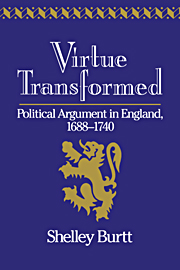Book contents
- Frontmatter
- Contents
- Acknowledgements
- 1 Introduction
- 2 The politics of virtue in Augustan England
- 3 A religious politics of virtue: Low Church Anglicanism and the Societies for Reformation of Manners
- 4 A republican politics of virtue: The selfish citizen in Cato's Letters
- 5 Bolingbroke's politics of virtue
- 6 The Court Whig conception of civic virtue
- 7 A world without virtue: Mandeville's social and political thought
- 8 Virtue transformed
- Bibliography
- Index
2 - The politics of virtue in Augustan England
Published online by Cambridge University Press: 24 October 2009
- Frontmatter
- Contents
- Acknowledgements
- 1 Introduction
- 2 The politics of virtue in Augustan England
- 3 A religious politics of virtue: Low Church Anglicanism and the Societies for Reformation of Manners
- 4 A republican politics of virtue: The selfish citizen in Cato's Letters
- 5 Bolingbroke's politics of virtue
- 6 The Court Whig conception of civic virtue
- 7 A world without virtue: Mandeville's social and political thought
- 8 Virtue transformed
- Bibliography
- Index
Summary
February 1689, just over three months since William of Orange's army had landed at Torbay. James II was in France, having fled the country in late December. William was in London, the most likely candidate to fill the vacancy that James had created. A newly elected Convention Parliament was attempting to draft a “settlement” that would bring a new monarch to the throne under conditions set by the people of England. The parliament met for the first time on January 22. A Declaration of Rights was passed February 12; a formal invitation to William and Mary made on the thirteenth.
In three short weeks, English elites had successfully and on the whole peaceably overhauled the political foundations of their nation, exchanging an essentially absolutist system for the relative freedoms of a limited monarchy. But how best to consolidate the gains so miraculously obtained? For some the answer was a comprehensive “reformation of manners,” the sooner the better. The “inundation of immorality and irreligion” that had plagued the country under James II's reign had to be stanched if the health and stability of the new regime were to be secured. In fact, the firmly protestant regime ushered in by the Revolution appeared to many Englishmen ideally suited to the revival of a politics of public virtue made difficult by the religious and political commitments of the Stuarts. As one of the leaders of the Country opposition wrote of this time, “we expected virtue and honesty should have succeeded better than ever.”
Such sentiments were unfortunately mistaken, in part because so many people had precisely the same hope.
- Type
- Chapter
- Information
- Virtue TransformedPolitical Argument in England, 1688–1740, pp. 15 - 38Publisher: Cambridge University PressPrint publication year: 1992



